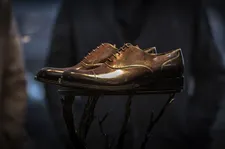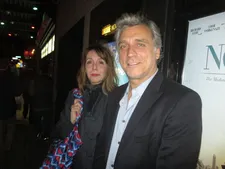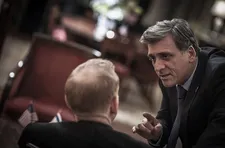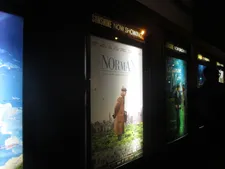_600.webp) |
| Lior Ashkenazi on being Micha Eshel: "He's enjoying himself because it's Manhattan, it's New York, you know." Photo: Anne-Katrin Titze |
On the opening night in New York at the Landmark Sunshine Cinema, Lior Ashkenazi, star of the Oscar-nominated Footnote and brilliant foil to Richard Gere's Norman in Joseph Cedar's Norman: The Moderate Rise And Tragic Fall Of A New York Fixer, spoke with me following the screening about the rehearsal process, his point of view on politicians, a Gene Kelly kind of freedom, and how he transformed from being the "sexy guy" to becoming two Prime Ministers.
Lior's upcoming films include José Padilha's Entebbe with Rosamund Pike and Daniel Brühl, where he portrays Israeli Prime Minister Yitzhak Rabin, and next Julie Delpy's My Zoe with Gemma Arterton, Richard Armitage, and Brühl.
_225.webp) |
| "Richard was leading the whole thing. He was getting down on his knees, trying to put the shoes on me ...'" |
Like a good fairy tale, Norman: The Moderate Rise And Tragic Fall Of A New York Fixer, takes our fears very seriously and places them in a slightly heightened realm. Richard Gere as Norman Oppenheimer turns out to be the perfect guide.
At an oil and gas energy conference, Norman notices one of the speakers, Micha Eshel (Lior Ashkenazi) and follows him on the streets of Manhattan. He sees in him a future, a connection, who knows. In front of the Lanvin shop window, he pounces. A pivotal scene early on, involving Isaach De Bankolé as the salesperson, results in the purchase of a very expensive pair of shoes. A few years later, Eshel has become Prime Minister of Israel. He remembers Norman, the stranger who bought him shoes, and the entire world will be affected by the consequences.
Anne-Katrin Titze: I would like to begin from the bottom up - with the shoes. Do you own the shoes? Where are the shoes now?
Lior Ashkenazi: They're in my closet, yeah. I couldn't resist taking them. They're very nice Lanvin shoes, of course.
AKT: Of course, Lanvin shoes that are slightly clownish.
 |
| Lior Ashkenazi as Israeli Prime Minister Micha Eshel |
LA: I actually paid production a symbolic sum - but I paid for them.
AKT: That scene is a little bit like a fairy tale - the scene in the shop with the shoes. I was thinking that Norman has something of a fairy godmother and you are Cinderella and you get to keep the shoes. And Isaach De Bankolé is in a way a witness to this transformation. Can you talk about how you see that scene?
LA: It actually starts like a silent movie scene. When we first met, we were rehearsing for two weeks and most of the scene is improvised, actually. It was written but we were improvising it. English is not my mother tongue, so Richard was leading the whole thing. He was getting down on his knees, trying to put the shoes on me and I was like "What are you doing?" It was something between our chemistry as actors at work there. Most of the Cinderella thing…
AKT: The magic?
LA: The metaphor, yes the magic, happened in those rehearsals and we took it to the shooting, of course.
 |
| "They're in my closet, yeah. They're very nice Lanvin shoes, of course." |
AKT: Talk a bit about how your perspective on politics changed by making this film. You probably did a lot of research looking at politicians - what you wanted Eshel to be and what you didn't want him to be.
LA: Well, it didn't change - my point of view about politicians.
AKT: It stayed the same?
LA: It stayed the same. Because as I see politicians, especially where I come from, I looked at them, like, liars and corrupt. So it was really hard for me to start. My starting point was pretty hard. I didn't want to judge the character because I know his motives are not mean or negative.
So I was trying to talk with a couple of Israeli Parliament Members. They're younger, similar to the profile of Micha Eshel as a member of Parliament. After I told them what the movie is about, they said to me, well, give us a day or two and we'll get back to you. And nothing. Nobody wanted to talk with me! To help me with the research. No one! So with Joseph [Cedar] we were trying to find out the motives and the way he behaves and becomes.
We were talking about the shoes - you can see, it's sort of clownish kind of shoes and we were trying to make him more soft, kind of with humor. And not as the politicians we know, which are very serious and cynical.
 |
| Lior Ashkenazi with Anne-Katrin Titze on the opening night at Landmark Sunshine Cinema Photo: Gary Springer |
AKT: The scene on the street before the shoe scene - you're walking through midtown Manhattan, eating chocolates on the sidewalk - you could turn into Gene Kelly at any moment and start dancing. There is so much joy in him [Eshel]. I think that is a part of him, too. We forgive him because he is enjoying himself so much [and at that point, it seems, not at the expense of anyone else]?
LA: Probably. And he's enjoying himself because it's Manhattan, it's New York, you know. He doesn't have anything to do, so why not enjoy himself? Nobody is watching him, nobody knows who he is. And actually that's what I felt when I was here. Because where I come from, I'm kind of, I'll say, a famous actor in Israel. I can walk on the streets of Tel Aviv.
AKT: But not like that?
LA: Not like that. Anonymously walking, like, free to do whatever I want. Nobody will try to take a selfie with me or talk to me or whatever. So I think it's the same feeling.
AKT: The same freedom?
LA: Freedom. It's freedom, yes. To do whatever you want.
_225.webp) |
| "I know Joseph and Richard were talking about it, the court Jew. They had like eight months of pre-production." |
AKT: The moment on the telephone near the end, when you tell someone that you're going to do something terrible to them and you want forgiveness in advance of doing that to that someone. That's hard to get away with and to still be likable. How did you work on that moment? It has so many layers.
LA: It was tricky. Because we didn't know if he is doing something … We have a couple of alternative ends to this scene. Eventually, Joseph put in the end in which I close the phone and throw it to the fish there. Which is like you can understand his motives. But it comes from a look to his advisor. He's done it because he asked him to do it.
He didn't want to do it. It's a couple of motives there. We tried to. Because he does love Norman. Although he has lots of Normans in his life. Especially this Norman, he's got something with this one. I won't say he is in love with him but maybe it's his first Norman.
AKT: This ties it back to the first phone conversation which both of you end with the words "I do."
LA: Yes.
AKT: So there's the promise to the first Norman.
 |
| "For me it wasn't like that. I was concentrating on just one thing. This politician…" |
LA: Which all starts with very guilty feelings with this Micha Eshel.
AKT: Another point that I am curious about is the connection with Jud Süß Oppenheimer and the shared last name and Joseph having planned a film on Veit Harlan which never happened. Did you discuss that about your role? Did you discuss the idea of the court Jew being Norman to you?
LA: Not at all. That was in the process of writing. I know Joseph and Richard were talking about it, the court Jew. They had like eight months of pre-production. So a lot of time for Richard to research and talk with Joseph and sort his ideas about it. For me it wasn't like that. I was concentrating on just one thing. This politician - even the English I speak in the movie, it's like the Israeli politician English which they usually use.
AKT: You tasted blood playing Prime Minister? We will see you as another one soon?
LA: Yeah, I just finished shooting a movie called Entebbe, based on the Israel operation in '76 in Entebbe. There I will do Prime Minister Rabin, who in 1976 was the Prime Minister of Israel. It's kind of a [type] casting now, I guess.
 |
| Norman: The Moderate Rise And Tragic Fall Of A New York Fixer poster at Landmark Sunshine Cinema Photo: Anne-Katrin Titze |
AKT: No other roles for you from now on!
LA: I was the sexy guy 15 years ago! Now I'm the Prime Minister!
Read what Joseph Cedar had to say on the work of Richard Gere, costumes and cast in Norman: The Moderate Rise And Tragic Fall Of A New York Fixer
Read what Joseph Cedar had to say on filming in New York City, production designers, Kalina Ivanov and Arad Sawat creating a Lanvin shop window, his Alber Elbaz Oscar red carpet experience for his film Footnote, defining luxury, and what is and is not a fairy tale.
Norman: The Moderate Rise And Tragic Fall Of A New York Fixer is in cinemas in the US.





















